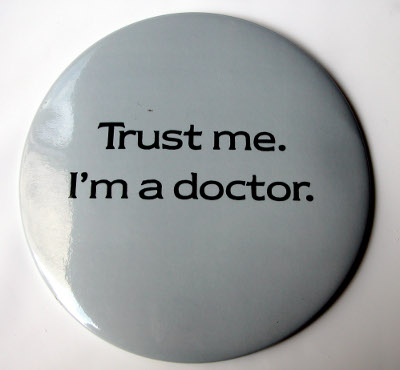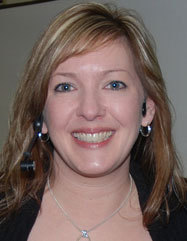Internet Credibility. How do you Get It?
It’s another Expert Briefs, where I ask really smart business owners to answer your burning questions.
Credibility. How do you Get it? Why is it Important?
I've been thinking more and more about credibility. Specifically internet credibility and business credibility.
About WHO I am online and WHAT I have earned the right to teach (and to charge money to do so).
For instance, it would be ridiculous for me to host a webinar teaching others how to become a Powerseller on eBay (unless I was interviewing someone else who actually was one).
However, I would rock the house on “how to start a PLR site” because I've done it – 3 times, with solid profits for each site.
On the one hand, anyone can hang up a sign and say “I'm a expert” but how do you prove that you actually are?

It reminds me of this great graphic –>
If someone knocked on your front door right now and offered to give you a FREE medical exam, would you strip your clothes off then and there and take them up on their offer? (Caveat: Assume that he doesn't look like George Clooney. lol!)
What if the person offering the free exam was wearing that button on their shirt? ->
THEN would they be credible?
I hope your answer is “NO”. They have to earn the right to do so.
So, let's talk about credibility.
“What does Credibility mean to you? Is it important? How do you narrow down where you've got it? If you don't have it… what can you do to get it?”
I think you'll find the answers this week interesting and hopefully inspiring.
 Connie Ragen Green of ConnieGreen.com says:
Connie Ragen Green of ConnieGreen.com says:
Credibility was something I struggled with when I first came online.
Like many new entrepreneurs, I wasn't sure that I had anything of value to offer to others. During that first year I set about to develop my credibility and to build a platform that would serve me for years to come.
I believe that anyone can build a platform for their business. This has to do with who you are, what you stand for and believe in, and how you can be of service to others. We build our platform with our writing, our teaching, and our interactions with others.
It all starts with you deciding exactly what message you want to get out to the world. Most of us came online in order to share and teach others about a specific topic and idea. Use this as your starting point to establish your credibility. Tell the story of where you were, what that was like, and how that has helped you to become the person you are today.
People are familiar with my story of how I worked as a classroom teacher for twenty years, while also working in real estate in order to make ends meet. I was exhausted from working seven days a week, and after dealing with a work related injury and surviving cancer I decided to start a business I could run from my home computer. Now I am an online entrepreneur and I have the time and money to live the life I had always dreamed of. My message is that if I can do this, so can anyone else.
This story established my credibility and laid the foundation for my platform. I then began the process of blogging; writing articles; hosting teleseminars, webinars, and in person workshops; and interacting on a daily basis through social media.
Get started today. Give serious thought to the message you want to share with the world and how you want to serve others. Then start writing, teaching what you know, and interacting with others to build your platform.
If I can do this, so can you!
 Rachel Rofe of RachelRofe.com says:
Rachel Rofe of RachelRofe.com says:
In my opinion, credibility is as important as honesty.
I think anyone can make a product about anything as long as they're totally upfront.
For example, I'm in the process of creating a product about juice feasting. I'll be writing about people who have juice feasted 90+ days, but the longest I've ever gone was 10 days.
I will be totally upfront with people in the product. I'll let them know that I'm by no means an expert, but I wanted to condense all the research and knowledge I've found into one book.
This way I don't have to feel like I'm “lying”, but I still get to have a product about something I'm super-interested in.
Sure, I'm not a traditional “expert”, but some people are going to resonate with the way *I* synthesize the information versus how others do.
Another example is with the make money market. I see so many people selling products on how to make money when they don't have any themselves. For YEARS I've been telling people they should start their own blog (something like Amy Bass did with MyDebtFreeGoal.com).
They could let people know they're not experts yet, but that they have goals (pay off debt, pay for children's school, whatever). They could try out different methods of making money and let their audience know exactly how it's going – what they're trying, what's made them money, etc.
This way not only do they have the public accountability of their goal, but as they start to make more money they look like experts to others who haven't made any yet.
I think there's ALWAYS a way to get into a niche without having to feel not “credible” enough, you know?
So Nicole, let's go back to your PowerSeller webinar. I would say you could still totally have one just by saying you've researched all about PowerSellers and want to share what you've learned. Obviously you wouldn't talk about how you've made $1,000,000 per second (in your underwear!) by selling stuff there… but I'm sure you'd still have great information.
Anyway, that's my $.02 on the matter. 🙂
 Lynn Terry of Clicknewz! says:
Lynn Terry of Clicknewz! says:
My reply 🙂 …
You know what, I'm going to take the opposite angle on this topic, because sometimes you just don't need credibility – and in some cases it can serve you better not to even try.
Let's say that you want to start a new website on a topic you're absolutely crazy about, but have no real-world hands-on experience with… yet. Perhaps it's an affiliate site on remote control helicopters. And let's imagine you chose that niche because it's something you've always wanted to get into.
Instead of trying to be an expert on the topic, be “the guy next door”. Be the person your market can relate to, and follow through the process of getting started. Let them go through the experience with you, through every little detail.
Think about it. Who do trust more when you're looking for real opinions – your neighbors and friends, or “the expert online”?
Be transparent, fun and personable and you can easily build a loyal following of people interested in your topic.
 Kelly McCausey of Work at Home Moms Talk Radio says:
Kelly McCausey of Work at Home Moms Talk Radio says:
Some think credibility is about having a polished presence that makes them look awesome. Sadly, people buy into it. A new design client of mine came to me from another provider who had really let her down. She thought she could count on them because ‘they had the most beautiful flashy website'. She learned the hard way that all that glitters is not to be trusted.
The longer I'm in business on the web, the more weight I place on getting a referral from a trusted person. If someone I trust tells me that you do good work and meet deadlines, I'm very likely to believe it and pursue a project with you when the need arises. On the flip side, if a friend tells me that you were late and delivered mediocre results, I'm never going to give you a second look.
Credibility is earned one reliable action at a time.
 Tony Shepherd of HippyMarketing.com says:
Tony Shepherd of HippyMarketing.com says:
Credibility is like a wife or husband.
You really do need to get your own and while it can be a lot of fun if you borrow someone else's, it doesn't last long and invariably gets you into trouble.
Everyone has their online heroes, whose style they admire and enjoy – but it's too easy to fall into the trap of trying to be that person.
It doesn't work.
I firmly believe that credibility is not something you manufacture. I think that it simply grows on it's own as you learn more about your trade and fall into being comfortable with yourself as an online marketer.
If I was trying to be something I'm not online just to achieve credibility faster or easier than it should arrive, I'd collapse under the strain. Acting out a role is exhausting and just doesn't work.
It's like you've fallen out of the BS tree and hit every branch on the way down. People can spot lack of cred a MILE away.
We've all seen the guys who somehow just don't ‘feel right' when you visit their blog or buy their products. Their credibility is either borrowed or manufactured.
To me it doesn't work.
The good news is that achieving all the credibility you could ever want is easy.
Ridiculously easy actually.
You just have to be who you are. If your grammar is a bit iffy or your blog posts are full of typos – what the Hell, it's who you are.
If you're naturally abrasive, or cynical or loving then stay that way.
You ever seen people – usually eyewitnesses to some event – interviewed on the news? They suddenly start speaking in ways they'd never dream of using to their
mates in the pub ‘I was horrified to see that the cars proceeded to crash into each other, seemingly without reason. Following cars tried to avoid the mayhem but no avail!”
NOBODY speaks like that in real life and it's the same when you're trying to establish your online cred.
Credible people are more credible BECAUSE they've got flaws and faults, not because they're shiny and perfect. Even Ghandi had knock-knees.
Anyway for all your flaws and faults, your mum still loves you, as do your children, husband, wife and that blonde you're knocking off from the corner shop.
And they love you for yourself. End of story.
If you can be yourself online then you'll find success.
It doesn't mean everyone will like your style – they WON'T. But it does mean that the crowd of people who DO follow you will resonate much more with you than other
marketers. Because they've chosen you for who you are.
To me that's true credibility. It's honest, fun and very very profitable!
Cheers
Kristen Eckstein of Finish Writing Your Book Fast: Accountability for Procrastinators says:
Naturally my answer will revolve around the credibility a book gives you. There is nothing quite like a hard-copy, printed, book to give you that instant credibility of a published author and accomplished in your field. Putting a book together is hard work, and to do it right with a quality that reflects the quality you strive to achieve in your business is not always easy. However, when you have that hard copy book at the back of the room, it screams, “Look at me! I know stuff that can help you, and I wrote it all down in an easy, affordable format for you to reference. It's like having me in your pocket all day long!” And who wouldn't want you in their pocket, ready to answer their questions at a moment's notice?
Anyone can create a 20-30 page PDF and toss it up online, calling themselves a published Ebook author. But it takes someone who's diligent in their field, who wants to give something tangible and real to their audience, to create a 150-250-page printed and bound book. There will never be a replacement that speaks to the same level of dedication and expertise.
If you were seeking speakers for an event and had the choice between two people who would teach the same content with the same level of quality, but one had a book and one didn't, which one would you choose? Case in point.
 Ronnie Nijmeh of PLR.me (< -click for a special free offer from Ronnie) says:
Ronnie Nijmeh of PLR.me (< -click for a special free offer from Ronnie) says:
Credibility is key.
It's all about building rapport, while proving that you are someone your target person should trust and respect… and this is critical particularly online.
Credibility doesn't necessarily mean that you have to have a few dozen letters after your name, but it does mean you should have something of value to contribute based on your own experience, or the experience of others around you (i.e. interviewing an expert).
With that said, I don't think it's particularly difficult to become a credible source of information. Really, it's about knowing, doing, and breathing your expertise. It's about confidence, learning, and continual improvement.
This reminds me of a great movie I saw recently called, “The King's Speech”… I won't ruin it for you, but it's all about an expert helping King George VI overcome a speech impediment. Watch it!
In one of my businesses, people know me as the “Stress Coach” because I worked hard in that niche. I did plenty of research, surrounded myself with experts, I published a lot of great content that was truthful and valuable, and I wrote a full-scale book. No, it wasn't all done in a weekend, but it wasn't all that difficult either.
Turns out… when you do all that, you get noticed by the media – and the media LOVES authors – so I found myself getting calls nearly every week for newspapers, radio stations across North America, and even national talk shows in Canada.
All that media exposure just built up my credibility, especially since I embedded those video and audio clips on my sales pages. You can imagine how that affects your perception as an expert!
With all that said, you can gain credibility through a variety of ways:
- Surround yourself with experts – either through JVs, interview series, or on your team
- Constantly research and learn about your niche.
- Be perceived as the go-to expert by putting out lots of great content, resources, tools, videos, webinars, and so on. (Few people do this because it involves work, which means if you actually do the work, you'll be far ahead of the game!)
- Become an author – it's not as hard as you think, especially if you use good quality PLR, like PLR.me stuff. 🙂
- Do media appearances or be interviewed by other respected people in the field, then post those appearances all over your site and email autoresponders (this isn't a required step, but it's helpful)
Have fun becoming the go-to expert!
 Mark Mason of MasonWorld.com says:
Mark Mason of MasonWorld.com says:
For me, credibility is 100% about honesty, integrity and transparency.
- Honesty is about telling the truth (even when it is not fun).
- Integrity is the stuff that you do when no one is watching.
- Transparency is about letting people know what you are doing and why you are doing it.
If you master those things, then credibility follows automatically.
Once you have established honesty, integrity and transparency, you can start to think about becoming a thought leader or expert in your niche. This always means sharing the things that you do know about and admitting to the things that you don't know about.
One thing to remember — if you know ANYTHING about internet marketing, you know more than I did when I started out in 2007. I was a computer tech expert, but I did not know anything about AdSense, eBooks, WordPress, blogging, etc. You don't need to know everything to share valuable information. If you know something that can help someone, you are an expert from their point of view.
The trick is to apply honesty, integrity and transparency when you share. Don't be something you are not.
For those of you following along, feel free to apply this idea in your personal life. It works even better there.
 Jeanette S. Cates, PhD of JeanetteCates.com says:
Jeanette S. Cates, PhD of JeanetteCates.com says:
Credibility is the combination of a track record and believability. And credibility is a mix of overt and subconscious impressions.
In the offline world, credibility is often based on outward appearances, both seen and sensed – a degree on the wall, your name on the business, the thickness of the carpet, the quality of your clothes, the location of the building.
Offline we subconsciously recognize credibility. But online we actually do the same thing. A professional photo of the person, professionally designed graphics, a company logo, a “line” of products. Even the “proof” that someone knows what they are doing – income statements, portfolios, the appearance of being “everywhere”, face videos, your testimonial on a high-selling site, your interview listed with other online well-knowns.
If someone “looks” successful, whether online or offline, we assume they are. After all, that's what makes for a great scam – the trappings of success.
Where the rubber meets the road is through recommendations. Offline, they could be the letters framed on the wall (testimonials), the photos with famous people (credibility through association, an implied endorsement), the personal recommendation of a friend, neighbor or colleague.
Online we see the same things – testimonials on your sales page and blog, tweets, blog posts and emails recommending a particular person or product, pictures on your site and your Facebook wall, a direct referral from someone you trust.
It's the recommendation that gives you the believability. And it's the outward symbols that demonstrate your track record. Together they give you “credibility.”

Shannon Cherry of S.A.L.E.S. System Formula says:
Everyone wants it. Many say they have it. But the fact is credibility isn't something tangible. Credibility is deeper than that.
Credibility isn't fame or success. I see many people confuse the them. I mean, I bet you know someone who is famous but not credible. Yet online, people interchange the two WAY too often in my opinion.
Credibility has two key components: trustworthiness and expertise. If you are an expert in something, (and I know you are!) then you've got half the battle won when it comes to credibility.
Trustworthiness is a lot harder. It's about being honest and working hard to gain respect from people. That means you need to build relationships. Building great relationships are a vital part of earning credibility and making money in Internet marketing. Yes, this will take a little time, but worth the efforts.
 Susanne Myers of AffiliateTreasureChest.com says:
Susanne Myers of AffiliateTreasureChest.com says:
Credibility is incredibly important for just about any online business. Unless you are building Adsense sites, you need to build a relationship and trust with your readers to make money online. It doesn’t matter if you sell your own products, a service or if you are an affiliate for someone else’s products.
So… how do you get the credibility? By doing what you are teaching or sharing on your site. I struggled with this quite a bit over the years. I was doing really well online and was making a very nice full-time income, but didn’t think I was enough of an expert to teach affiliate marketing. I didn’t want to be yet another person who teaches people how to make money online. That was until I realized that I was in fact an expert and was making quite a bit more than 95% of all other online entrepreneurs.
And I had done it with several different online businesses and taught my husband how to do the same. I think that’s what gives you true credibility. First of all the fact that you can repeat what you’re doing with similar (or even better) results and that you can successfully teach it to someone else. Having that track record has given me the confidence to call myself an expert affiliate marketer.
 Nicole Dean of .. here! .. says:
Nicole Dean of .. here! .. says:
Holy Moley. We're over 3000 words for this blog post already and I haven't even started yet.
It's interesting. When I asked the question, I had in mind credibility when creating infoproducts. Like why should someone trust you enough to buy what you're teaching. And, how do you prove that you know enough about the topic in order to sell people on that fact.
But it looks like we got answers from several angles.
In fact, we got so many answers from such a variety of angles that I had to go research and actually get straight in my head what exactly credibility was.
Credibility is: “the quality of being believed or trusted”Collins English Dictionary – Complete and Unabridged © HarperCollins Publishers 1991, 1994, 1998, 2000, 2003 (via The Free Dictionary)
That's credibility in general.
I also found that there's “Web Credibility”. Stanford University did a study on Web Credibility (You can see full results at Wikipedia.com.)
Here are the guidelines from the Standford Study on Web Credibility
1. Make it easy to verify the accuracy of the information on your site.
2. Show that there's a real organization behind your site.
3. Highlight the expertise in your organization and in the content and services you provide.
4. Show that honest and trustworthy people stand behind your site.
5. Make it easy to contact you.
6. Design your site so it looks professional (or is appropriate for your purpose).
7. Make your site easy to use–and useful.
8. Update your site's content often (at least show it's been reviewed recently).
9. Use restraint with any promotional content (e.g., ads, offers).
10. Avoid errors of all types, no matter how small they seem.
The standards for Web Credibility were all about an actual website, not a persona. It's a bit confusing since most of us are building a relationship and are branding ourselves (rather than an “organization”)- at least those who I normally connect with and the members of this panel.
So… if I were to take that list and “Nik-ify” it to how I'm personally working to establish credibility (believability & trust) on this blog, here's my list of 5.
Five Ways I Try to Improve My Credibility on This Blog
1. My Podcast.
I'm connecting with my audience in a way so that they can get to know me. Plus, I have other experts on my podcast, which boosts my value with the “Oprah Effect”. The Oprah Effect simply means that you don't have to be an expert if you can surround yourself with those who are. Expertise is like cooties. You can catch it. 🙂
2. Picture of me on the top of the page.
I'm obviously not a Stock Photo model that's on top of 100 other sites. I'm me.
3. My Private life.
I have photos from my private life on my blog. That's more of a likability thing, but it shows that I'm a real person. And, since I talk about being a wife and a mother – it's important that I show that I actually have kids and a husband, too.
4. Expert Briefs.
Yes, these compilation blog posts have several goals. One of which is to show that I have other experts who know, like, and trust me enough to let me borrow some of their credibility.
5. Interaction.
I read every single comment that I get on this blog and try to respond to as many as I can in order to show that there's a real person behind this website.
But those 5 Things are not the same as when I'm creating an infoproduct or if I were a service provider of some sort, trying to get clients.
When I'm trying to sell a product, other things are more important.
5 Tips for Increasing Credibility when Selling an InfoProduct
1. Testimonials for Social Proof.
I like to use screenshots of Tweets for social proof. It's public. It's real. And, I can prove it. For instance, I've collected several, including this one that I'm proud of:

2. Congruency.
I wouldn't feel comfortable teaching a course about article marketing unless I'd personally done it with good results. Which I have.
On the same note, I wouldn't purchase a course on video marketing if I saw the person selling it had only 3 videos on YouTube.com with only 200 total views. Show me a screenshot or video tour of your videos on YouTube including how many page views you've had. There should be some congruency there.
3. Honesty.
I'd much rather purchase a product where the person who created it said “I could have done better, but I made a few mistakes – that I'll help you to avoid” – than to be too slick and polished. But, that's a discussion for another day.
4. Guarantee & Contact Info.
Both of these help increase trust when someone is deciding whether or not to buy a product. If there's no contact information, I won't buy it. I don't care how good the product is. I need to know that there will be support if I need it.
5. No funny business and Be Clear.
I don't want popups flashing in my face. I don't want the price hidden when I try to find it. And, the thing that's been driving me crazy lately is when people don't tell you what the heck you're getting if you buy. There's one marketer who I'd LOVE to buy about 5 of his products, but every time I try to figure out what I'm getting, I get confused. I don't know if it's an audio course, a series of downloadable reports, videos, or a hard-cover book that will show up in the mail.
So, be clear. Be up front. And, remember that you're in the business of helping people, not squeezing their money from them as fast as you can. (oops. Soapbox snuck in there.)
Well, those are my thoughts. I know they're a bit scattered, but that's because everyone else's responses were so thought-provoking that my head is full of new ideas. 🙂
Recommended Resource
If you're interested in writing a book to gain credibility, be sure to check out Kristen's program:
Finish Writing Your Book Fast: Accountability for Procrastinators
It’s Your Turn.
So, now, I’ll pose this question to you. Do you have any special tips for establishing credibility? I’d love to hear your comments!
Warmly,
Nicole Dean
PS. I have created brandable reports from several of the previous Expert Brief columns that you can use to earn money by giving them away.

Peggy Baron
January 27, 2011 at 12:13 pmWow, what a great Expert Briefs, Nicole.
I found myself saying “yes, yes, yes” to each one I read. In fact, I can’t really think of anything to add here, except maybe to think about what makes someone credible to *you*, and how you can learn from that and apply it to your own brand and business.
Thanks. 🙂
Peggy
Nicole
February 12, 2011 at 10:40 amExcellent tip, Peggy!
Felicia Slattery
January 27, 2011 at 1:45 pmWell, Nicole, I’m sorry I didn’t get my brief to you in time, but I’m honored to get to comment 🙂
As a person who teaches a workshop and has an e-course called Credibility and Cash Flow, this is something I could write about for days (weeks? months?).
Credibility is the first step in the persuasive process. Persuasion is all about motivating someone to do something — and for us as online business owners that means buying our products and services. If people don’t believe you, or don’t believe what you offer will help them, they will move on. Fast.
One disturbing trend I’ve noticed online is people selling what they have not yet achieved. The main example that comes to mind: those hucksters selling 6-figure this and 7-figure that. If you have not yet achieved something, you cannot act as if you know.
Now to take an interesting turn, what Lynn suggested would be a cool work around. Let’s say you WANTED to make 6-figures in your business. You could start a blog announcing your goal and chronicling your path to 6-figures, using advice from others –and sharing them during podcasts and teleseminars and using your affiliate links to their products and services. Occasionally report on your progress toward your goal.
I’ve got lots of info on credibility in my ecource, but so much great stuff has been covered here. This is a lesson on its own!
Well done Nicole & everyone!
Walter Gavurnik
January 27, 2011 at 4:24 pmWow Nicole, GREAT Stuff!
One thing that really bothers me and kills credibility as far as I’m concerned
is how some marketers use email. They send a free gift but won’t say what it is!
I’m not going to waste my time clicking on links without knowing what I’m clicking
for. Why are the marketers afraid to tell me what they are offering? It may be an
adswap but, that’s ok if I know what the heck it is.
Thanks Nicole,
I follow all your tweets! 😉
Nicole
February 12, 2011 at 10:42 amGreat point, Walter!
Thank you so much for coming by. 🙂
Tambre Leighn
January 27, 2011 at 4:51 pmReally great compilation! As a cancer survivorship and caregiver coach, establishing expertise is especially important for interfacing with the medical community. My personal experience as a caregiver and someone whose husband died from cancer speaks to my clients. But there is more than just my story I must establish. Your post gave me some excellent ideas to notice what I’ve done already and where I can expand my efforts. thanks!
Dustin Luther
January 27, 2011 at 5:15 pmI recently started working with a Dun & Bradstreet spinoff (D&B Credibility) where we’re looking to move beyond business credit to also understand how to define the credibility of a business… so found this conversation extremely interesting. For the most part, we’ve been looking at algorithmic answers that can help a business understand their online reputation, but, as many of the experts point out, there’s many “soft” factors around perception that play a huge part in a business’ credibility (or lack of credibility).
Ian
January 27, 2011 at 5:16 pmWow, this is my first time reading such a refreshing post. Thanks for giving such insightful advice. Nicole you rock!
Thomas Northrop
January 27, 2011 at 5:22 pmHi Nicole
My comment is more about how to lose credibility then on how to get it.
I guess I think of this because of what is happening right now in the Internet Marketing world with alot of the “gurus” and “super affiliates.
There has been a rash of really crappy products launched lately with the now famous $37 price tag and then the five upsells.
There have been many people promoting these crappy products. These are people who have enough money that they do not need to promote crappy products.
Some of them I used to trust.
But, they now have lost their credibility with me, and also my subscription to their list.
So, I wonder how many other people feel the same way.
And what is the pricetag for credibilty.
Oh well I am done.
Thats my thought on the matter
Jo Dodds
January 27, 2011 at 6:37 pmI love this post. One of my themes at the moment is authenticity. I’ve recently seen some big names not being authentic and it has prompted me to reflect on what that means to me, and I think it’s really wrapped up with credibility as well as transparency as Mark mentions. I too was nodding and agreeing with all the points raised here. I guess we are not of the ‘fake it ’til you make it’ persuasion here!
Someone interviewed me recently and said that I was exactly as they expected me to be having ‘met’ me on my website and social media and I took that as the greatest compliment. Nicole, that is something that I think you do really well and your tips keeping you ‘real’ are really useful.
I also loved Tony’s husband or wife analogy!
Tawnya Sutherland
January 28, 2011 at 12:41 amCredibility to me means “trustiworthiness” (is that even a word??). As for the term Expert, if I trust someone and believe in them as a person/company, then they can tell me they are an expert at whatever they want and I’ll believe it. 😉 I buy from websites/people I trust in the end. Purchasing online for me all boils down to one thing > Trust = Buy.
And I don’t trust…
1. A website with a postoffice box address. I want to know this. Why? Because if they don’t deliver it to me then I can physically get out of my slippers, put on my steel toed heels and go knock on their door to get it from them. A website without contact information doesn’t put me at ease. Seeing a telephone number is important for me too.
2. bozo@gmail.com, bozo@yahoo.com email addresses. (Anyone remember before yahoo it was bozo@geocities.com?) Do I need to say anymore? I know everyone is joining the CLOUD and using Gmail for everything nowadays but personally, I still like seeing an email from a company with their name on it like cool@companyname.com, call me old fashioned but it somewhere makes me trust that this is a real company I’m buying from.
3. Selling something you don’t fully back yourself. Example) If I am looking for Internet marketing services and the company’s website isn’t ranking high in the search engines themselves then that tells me they probably won’t get my site very high in the search engines either.
4. Your last blog post was dated May 10, 2009. If you aren’t up to date on your blog, then its highly likely that ebook I’m thinking of buying from you is out of date too.
5. People who never respond back to my tweets/facebook comments. Hey, if you can’t take a minute to answer my product question or even acknowledge my existence, maybe I just won’t buy your product then. Tit 4 Tat ;|
6. If a quick Google search of the website or person’s name shows up with SPAM/BBB complaints on the first page. DUH!
As Kelly McCausey said “Credibility is earned one reliable action at a time”
Sleep awaits me or I’d write more! Great topic Nicole although my tired fingers went off topic a bit but I’m going to click/send anyhow 🙂
Carol O.
January 28, 2011 at 8:03 amGreat post , Nicole. Each expert offered sound advice on what every marketer should be doing to create their credibility online. I know from my own business I have to prove my credibility, through testimonials, content and great customer contact/service. People are not only interested in my experience in my field, but my story in getting there and how I treat them as a fellow human.
Your post gave me excellent insight on where I could improve on my own credibility.
Marketing Footnotes
January 29, 2011 at 4:00 amHere’s a few things that lead me to believe a site has credibility.
1. There’s an about me page with contact info.
2. privacy policy and terms and conditions pages
3. lots of comments and lots of readers (social proof)
theodore Ikpa
January 29, 2011 at 1:59 pmI did not need all this amplification to SENSE your transparency and credibility. But thanks immensely for the effort. I will not need to consult wilkipedia for a definition of credibility. It has been Nikified.
Theodore
Zenobia Garrison
January 31, 2011 at 9:19 amThanks Nicole, this is a great discussion. I believe credibility comes about through your story. Your ability to eloquently and authentically illustrate the before and after
— your transformation — will foster an instant connection with someone who can’t help to say, “Yea she get’s it” and become an instant fan. So whether you’re a newbie or top guru, it’s important to focus on harnessing your experiences and what you do best in a big way to be believeable!
Paul Serwin
January 31, 2011 at 7:47 pmNicole, I’ve been reading your blog for a while and this article was really awesome! I like the different views presented by these great entrepreneurs! These are very thorough tips that will help many people (including myself) in growing their businesses!
John Sizemore
February 1, 2011 at 3:05 pmI agree with Lynn! I have a site teaching beginners how to play guitar. I’ve been playing and teaching for over 20 years. My wife on the other hand has just started taking my lessons online and has never picked up a guitar before. She also has written several articles about learning the guitar and so have I. Her articles get double the click through rate as mine. She doesn’t claim to be an expert. She just writes about her learning and progress. Sometimes not having credibility is a good thing. 🙂
Patty Gale
February 2, 2011 at 10:31 amOur company works mostly with offline business owners in helping them to get on the web and establish a strong web presence.
They have great credibility in their local communities and sometimes we see them expect instant credibility once their web presence is launched. It’s a great opportunity for us to educate them about this topic.
People don’t buy your products and services because they need them, they buy your products / services because they believe what you believe.
You can’t buy credibility. It’s earned by being authentic, transparent and reliable with your audience, letting them see you so they can get to know you and builds over time.
You can be great at what you do without self-proclaiming to be an expert. You can claim yourself to be an expert without having anything to back it up.
The real test comes when you serve your audience and they do well because of your efforts and tell other people about what you do.
Dennis - LG Lz9700
February 8, 2011 at 12:26 amI have to agree with what Lynn has shared. Trying too much to achieve credibility may just make you look unnatural. I guess the best way to really achieve authentic credibility is to just focus with the quality of your services/products and every thing should fall in its place.
ben
June 9, 2011 at 12:42 amI agree with Lynn Terry of Clicknewz, though credibility is important , I am still with trusting with the neighbor, that means just being always there foe me, not just because he/she is an expert.